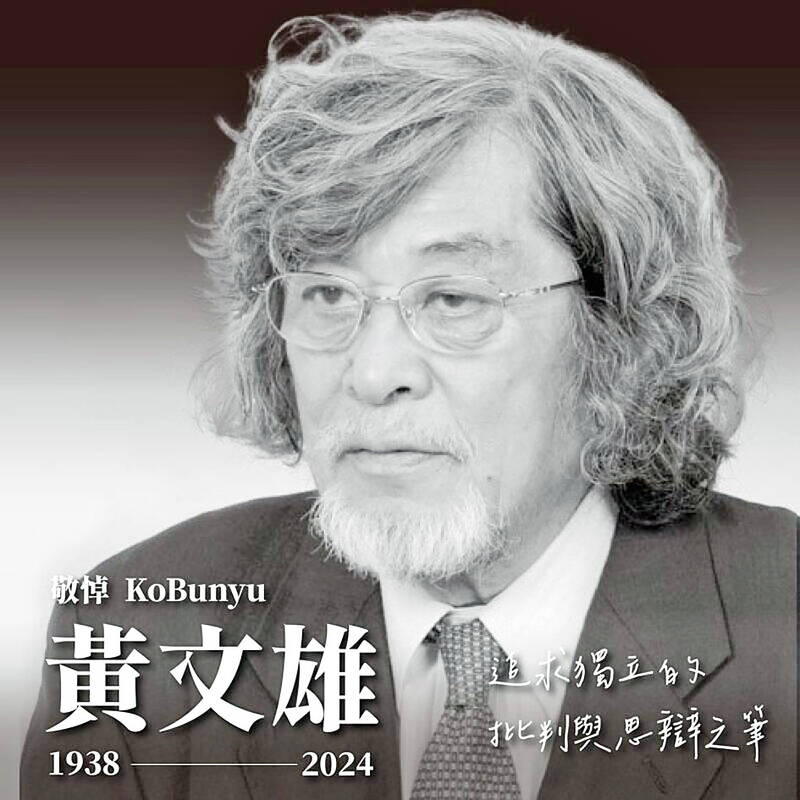People paid tribute to author and historian Ko Bunyu (黃文雄), known for his efforts to build a Taiwanese nation, at a commemoration event organized by World United Formosans for Independence (WUFI) in Taipei on Friday.
Ko, who passed away in July at the age of 85, was an influential figure in the Taiwan independence movement. He was called the leader of the “first generation of defenders of Taiwan,” among many other tributes at the event.
“Ko was a good friend of mine, we used to work together, running a Taiwanese alumni association for Waseda University. He had been a staunch defender and warrior for Taiwan throughout his life,” WUFI chairman Richard Chen (陳重光) said during the commemoration.

Photo: Screen grab from Avant Garde Publishing’s Facebook page
Ko studied at Waseda University in Japan in 1964.
Chen said that Ko in his student days published articles and edited magazines for the Taiwanese community, questioned the legitimacy of the Chinese Nationalist Party’s (KMT) military occupation of Taiwan and advocated for building up a Taiwan nation.
“Ko and his writing have established him as a pioneer of the independence movement. He had called for a free and democratic society for Taiwan since the 1960s,” he said.
Chen said Ko had also worked for many years as a visiting professor at Takushoku University in Japan after graduating from Waseda in 1969 and obtained a master’s degree from Meiji University in 1971.
The then-KMT regime in Taiwan canceled his passport and banned him from returning home due to his activism for Taiwanese independence, effectively forcing Ko to live in Japan, Chen said, adding that Ko later became a Japanese citizen.
Ko and his friends founded several organizations for Taiwanese students and political activists in Japan, and headed WUFI’s Japanese chapter for many years, Chen said.
Ko was also among the organizers of the World Federation of Taiwanese Associations (世界台灣同鄉會) in 1974, he added.
Chen said Ko was most famous for writing books in Japanese in the 1970s, most of which were translated into Chinese later, that were focused on the historical, societal and political issues of Japan, Taiwan and China.
Through the years, Ko’s stature and influence grew, with eight of his published works in the 1990s being listed as one of the year’s top 10 books in Japan and three his works earning the top spot as the year’s best-selling book.
Many of his books and articles advocated for Taiwan nationalism and independence, stating that the nation has never been part of China, and has more cultural, societal and historic links with the Japanese.
Among his most prominent published works were Taiwan has the Criteria to Form a Nation (台灣國家的條件), The Bushido Spirit Bequeathed to Taiwan by the Japanese People and The Decline of China (中國的沒落).
When the Democratic Progressive Party came to power for the first time in early 2000, Ko and other Taiwanese figures worked with then-Taiwan representative to Japan Hsu Shih-kai (許世楷) and began lobbying efforts that convinced the Japanese government to grant visa-free status to Taiwanese.

US climber Alex Honnold is to attempt to scale Taipei 101 without a rope and harness in a live Netflix special on Jan. 24, the streaming platform announced on Wednesday. Accounting for the time difference, the two-hour broadcast of Honnold’s climb, called Skyscraper Live, is to air on Jan. 23 in the US, Netflix said in a statement. Honnold, 40, was the first person ever to free solo climb the 900m El Capitan rock formation in Yosemite National Park — a feat that was recorded and later made into the 2018 documentary film Free Solo. Netflix previewed Skyscraper Live in October, after videos

Starting on Jan. 1, YouBike riders must have insurance to use the service, and a six-month trial of NT$5 coupons under certain conditions would be implemented to balance bike shortages, a joint statement from transportation departments across Taipei, New Taipei City and Taoyuan announced yesterday. The rental bike system operator said that coupons would be offered to riders to rent bikes from full stations, for riders who take out an electric-assisted bike from a full station, and for riders who return a bike to an empty station. All riders with YouBike accounts are automatically eligible for the program, and each membership account

NUMBERS IMBALANCE: More than 4 million Taiwanese have visited China this year, while only about half a million Chinese have visited here Beijing has yet to respond to Taiwan’s requests for negotiation over matters related to the recovery of cross-strait tourism, the Tourism Administration said yesterday. Taiwan’s tourism authority issued the statement after Chinese-language daily the China Times reported yesterday that the government’s policy of banning group tours to China does not stop Taiwanese from visiting the country. As of October, more than 4.2 million had traveled to China this year, exceeding last year. Beijing estimated the number of Taiwanese tourists in China could reach 4.5 million this year. By contrast, only 500,000 Chinese tourists are expected in Taiwan, the report said. The report

Temperatures are forecast to drop steadily as a continental cold air mass moves across Taiwan, with some areas also likely to see heavy rainfall, the Central Weather Administration (CWA) said. From today through early tomorrow, a cold air mass would keep temperatures low across central and northern Taiwan, and the eastern half of Taiwan proper, with isolated brief showers forecast along Keelung’s north coast, Taipei and New Taipei City’s mountainous areas and eastern Taiwan, it said. Lows of 11°C to 15°C are forecast in central and northern Taiwan, Yilan County, and the outlying Kinmen and Lienchiang (Matsu) counties, and 14°C to 17°C